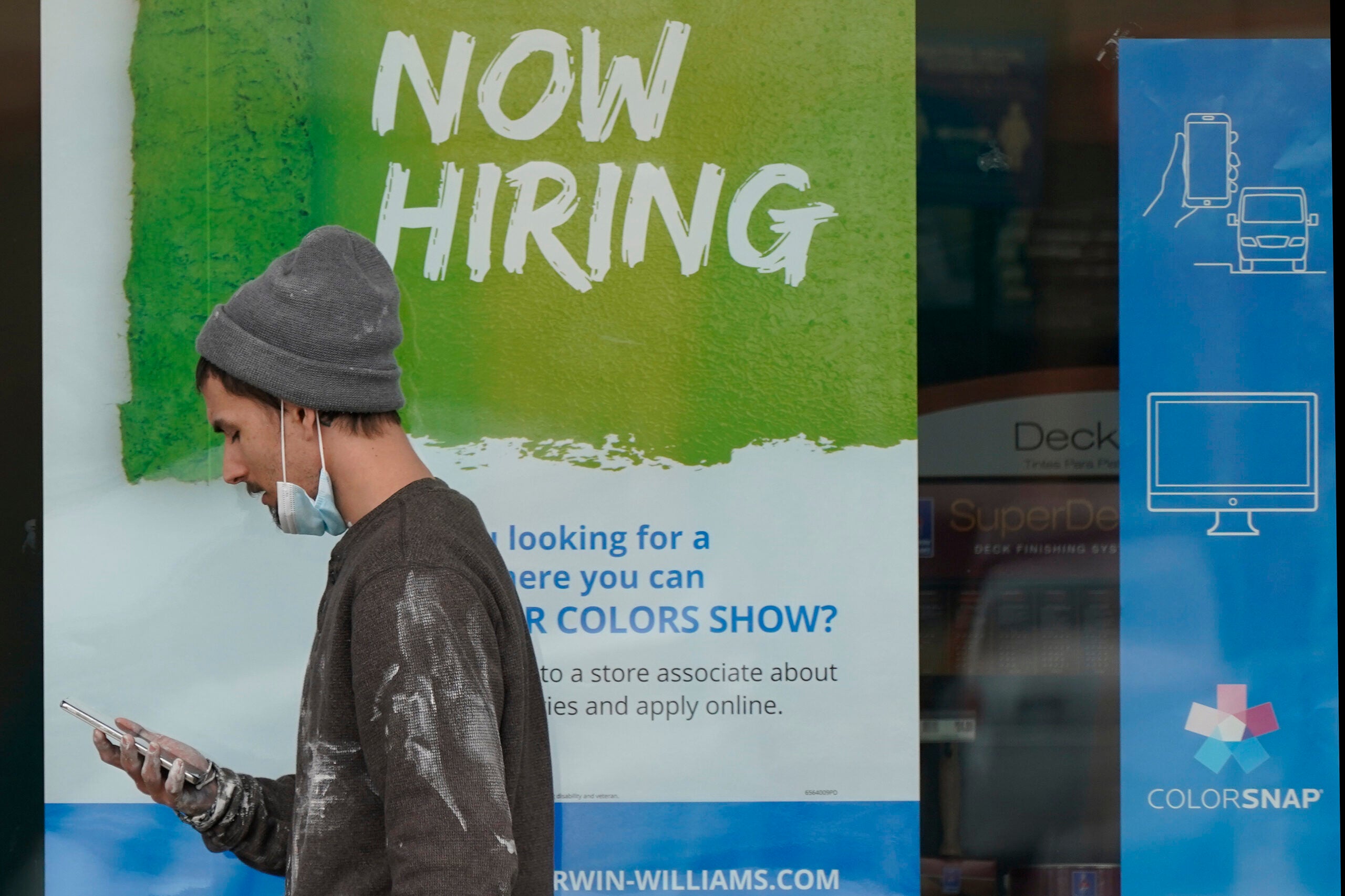Despite the repeated body blows to the state’s economy brought on by the ongoing COVID-19 pandemic, unemployment rates in Wisconsin have fared better as the pandemic has ebbed and flowed, the Capitol Times reported this week.
The paper cited numbers reported last month by the U.S. Bureau of Labor Statistics that “offer further evidence that the state’s economy is recovering far faster than anticipated.”
Although the state lost more than 400,000 jobs — with the unemployment skyrocketing to nearly 15 percent — when the pandemic first swept across the country in the spring 2020, those numbers have receded as the economy regained its footing during the past two years. Capitol Times reported that about 100,000 of those lost jobs haven’t returned.
News with a little more humanity
WPR’s “Wisconsin Today” newsletter keeps you connected to the state you love without feeling overwhelmed. No paywall. No agenda. No corporate filter.
Currently, Wisconsin’s statewide unemployment rate is 2.8 percent and “Wisconsin was one of 12 states where unemployment dropped to record lows in December, as the U.S. rate (3.9%) fell to its lowest level since the pandemic began,” the paper reported.
The paper interviewed several economic experts, who sought to explain and contextualize what is happening with the state’s economy. Menzie Chinn, a professor of economics and public affairs at the University of Wisconsin-Madison, said the “this can be attributed to the combination of strong fiscal and monetary policies to support the economy.”
Wisconsin DHS: COVID-19 Weekly Recap
The seven-day average for new COVID-19 cases in Wisconsin is 1,371 as of Thursday. The Wisconsin Department of Health Services has confirmed 11,724 total deaths from the disease.
More than 60 percent of Wisconsinites are fully vaccinated — 82.4 percent of people age 65 and older, 56.2 percent of children age 12 to 17 and 22.2 percent of children 5 to 11 years old.
[[{“fid”:”1473471″,”view_mode”:”full_width”,”fields”:{“format”:”full_width”,”alignment”:””,”field_image_caption[und][0][value]”:”%3Cp%3EFans%20walk%20into%20American%20Family%20Field%20to%20watch%20the%20Brewers%E2%80%99%20season%20opener%20Thursday%2C%20April%201%2C%202021%2C%20in%20Milwaukee.%26nbsp%3B%3Cem%3EAngela%20Major%2FWPR%3C%2Fem%3E%3C%2Fp%3E%0A”,”field_image_caption[und][0][format]”:”full_html”,”field_file_image_alt_text[und][0][value]”:”American Family Field can be seen as people walk toward it on the sidewalk. “,”field_file_image_title_text[und][0][value]”:”Brewers Season Opener”},”type”:”media”,”field_deltas”:{“1”:{“format”:”full_width”,”alignment”:””,”field_image_caption[und][0][value]”:”%3Cp%3EFans%20walk%20into%20American%20Family%20Field%20to%20watch%20the%20Brewers%E2%80%99%20season%20opener%20Thursday%2C%20April%201%2C%202021%2C%20in%20Milwaukee.%26nbsp%3B%3Cem%3EAngela%20Major%2FWPR%3C%2Fem%3E%3C%2Fp%3E%0A”,”field_image_caption[und][0][format]”:”full_html”,”field_file_image_alt_text[und][0][value]”:”American Family Field can be seen as people walk toward it on the sidewalk. “,”field_file_image_title_text[und][0][value]”:”Brewers Season Opener”}},”link_text”:false,”attributes”:{“alt”:”American Family Field can be seen as people walk toward it on the sidewalk. “,”title”:”Brewers Season Opener”,”class”:”media-element file-full-width”,”data-delta”:”1″}}]]
Milwaukee Brewers look for public help to pay for ballpark’s future improvements
Less than two years after the public agency that owns American Family Field voted to end the sales tax used to finance the Milwaukee Brewers stadium, the Brewers are seeking new public help to pay for future improvements to the ballpark, the Milwaukee Journal Sentinel reports.
In a Jan. 31 board meeting, Rick Schlesinger, Brewers president of business operations, said long-term improvements are likely to cost more than the stadium district’s $87 million reserve fund.
According to Schlesinger, the Brewers aren’t looking to reinstate the 0.1 percent stadium sales tax, which collected a total of $605 million from residents in Milwaukee, Waukesha, Ozaukee, Washington and Racine counties.
Instead, he said, the club was looking for a creative solution “that involves a lot of stakeholders.”
Reports: Rodgers, actress call off engagement
Amid questions about his future in Green Bay and only days after being named the NFL’s MVP for the second year in a row, Packers quarterback Aaron Rodgers was again in the headlines this week. Reports surfaced that Rodgers and his fiancé, actress Shailene Woodley, have called off their wedding.
“They grew apart, both have busy careers and unfortunately their relationship took a backseat. There is no animosity and they will remain friends,” a source told CNN. Rodgers and Woodley’s representatives haven’t responded to CNN’s request for comment.
Rodgers has faced significant media attention this season. First, his delay in attending the Packers’ minicamp last summer, then the public uproar about misleading many about his COVID-19 vaccine status and his subsequent positive test during the season and lastly, his public statements that suggest his time in Green Bay might be coming to an end.
Woodley gained fame for her performances in films like “The Descendants,” “The Fault In Our Stars” and the “Divergent” series.

Epidemiologist Malia Jones shares some of her insights on the pandemic
Malia Jones has been the go-to epidemiologist for numerous media outlets, including us at Wisconsin Public Radio, The Cap Times, The Associated Press and a viral letter in the Milwaukee Journal Sentinel. She even “accidentally launched a small news company” called Dear Pandemic.
The epidemiologist at the University of Wisconsin-Madison’s Applied Population Laboratory juggles a lot.
In this interview with The Cap Times, Jones answers a lot of questions. And during the process, she shares what keeps her up at night, why she thinks and believes it’s too soon to stop wearing masks and why she wants everyone to be much more concerned about kids.
Jones told The Cap Times that one of the “big” questions on her mind is:
“How do we move from where we are now to something that’s more stable? I think this is the same question that’s on so many minds, and I know that because I’m getting a lot of questions that go something like, ‘Well, is it endemic?” or, ‘When will the pandemic be over?’
I think it’s unfortunately still kind of unclear how we move from where we are now to something that’s a little more predictable and stable. … Here in the U.S., one of the big questions is, When are younger kids going to get vaccinated, and what will the vaccine uptake look like for them? We can project a bit based on what it’s been like for the older groups of kids. That’s going to be the next big shift here.”
She also shared some things she has learned about the relationship between vaccines, vaccine hesitancy and politics:
“What I think we have learned is that the marriage of partisan politics and vaccines has really been a disaster for public health. … What we’re still learning is how long those attitudes will persist, how much they really matter in terms of population-level outbreaks in the future, and also their spillover effects on other vaccines. If we come out of this with 20 percent or 30 percent of the public having serious doubts about all vaccines, that would be an unimaginable disaster. That’s the thing that keeps me up at night, because then you’re looking at a future where measles is a routine thing.”
Not all tyrannosaurs were ‘big’ deals. Milwaukee Museum exhibit shows off the family tree.
The celluloid version of the Tyrannosaurus-Rex as a meat-munching machine might be a fine enough reflection of the evolved tyrannosaur. But earlier iterations, well before the Cretaceous period to which T. rex belongs, probably would a bit less intimidating to humans had they coexisted.
“We think of them as massive dinosaurs, but early on in their evolution, they were more like chickens and turkeys,” Milwaukee Public Museum curator Patricia Coorough Burke told the Milwaukee Journal Sentinel.
The Milwaukee Public Museum is hosting a temporary international exhibit from the Australian Museum of the evolution of these dinosaurs. Called “Tyrannosaurs: Meet the Family,” it runs through May 18.
Coorough Burke, who curates for the museum’s geological collection, told the Journal Sentinel that discoveries in Asia in the past several years have helped scientists get much clearer pictures about tyrannosaurs’ evolutions and characteristics like skin texture, feathers and color.
“The fossils coming out of Asia have been preserved in super fine sediment as opposed to coarser rock, which doesn’t preserve the details as well,” Coorough Burke said.
The exhibit will feature specimens from China that haven’t been seen before and a variety of tyrannosaur fossils.
Pooch Playoffs to raise funds for canine cancer research
Madison photographer Shalicia Johnson is once again hosting a March Madness-like competition for dogs in the area, reports Madison365. Dog owners can pay for a professional photo shoot of their pet, and those funds will go toward canine cancer research via Czar’s Promise.
The campaign is coined Pooch Playoffs. Photos of the dogs will be shared and viewers will vote for the cutest pup.
“This is something that is really important to me. The mission of Czar’s Promise is to fund canine cancer research,” Johnson told Madison365. “I know how hard it is to lose a pet. They are more than just a pet; they’re family. Straight-up family members.”
As of Feb. 17, entires for the competition are full. But keep an eye out for the 32 pooches, and vote for your favorite to be crowned the “Ulti-mutt Cutie.”
Last year was Johnson’s first time launching Pooch Playoffs, then only having 16 dogs in the competition.
“I’m one of those people if I could save all of the animals, I would,” Johnson said. “I feel like I’m trying to save all of the animals one portrait at a time business-wise.”
Getting survivors benefits amid pandemic closures
Throughout the U.S., Social Security Administration offices have been closed due to the coronavirus pandemic. With more than 920,000 total COVID-19 deaths in the U.S. so far, thousands of people have been seeking Social Security survivors benefits — a majority being women, the 19th reports.
Applications for survivors benefits are taking weeks, and sometimes months, to process.
“The fact that the (overall) data fell, that tells you people are having trouble getting access,” said economist David Weaver, a former associate commissioner in Social Security’s Office of Research, Demonstration and Employment Support. “The deaths are highly concentrated among the populations that Social Security serves. Those deaths are creating widows and survivors.”
Editor’s note: The Associated Press contributed to this report.
Wisconsin Public Radio, © Copyright 2025, Board of Regents of the University of Wisconsin System and Wisconsin Educational Communications Board.






